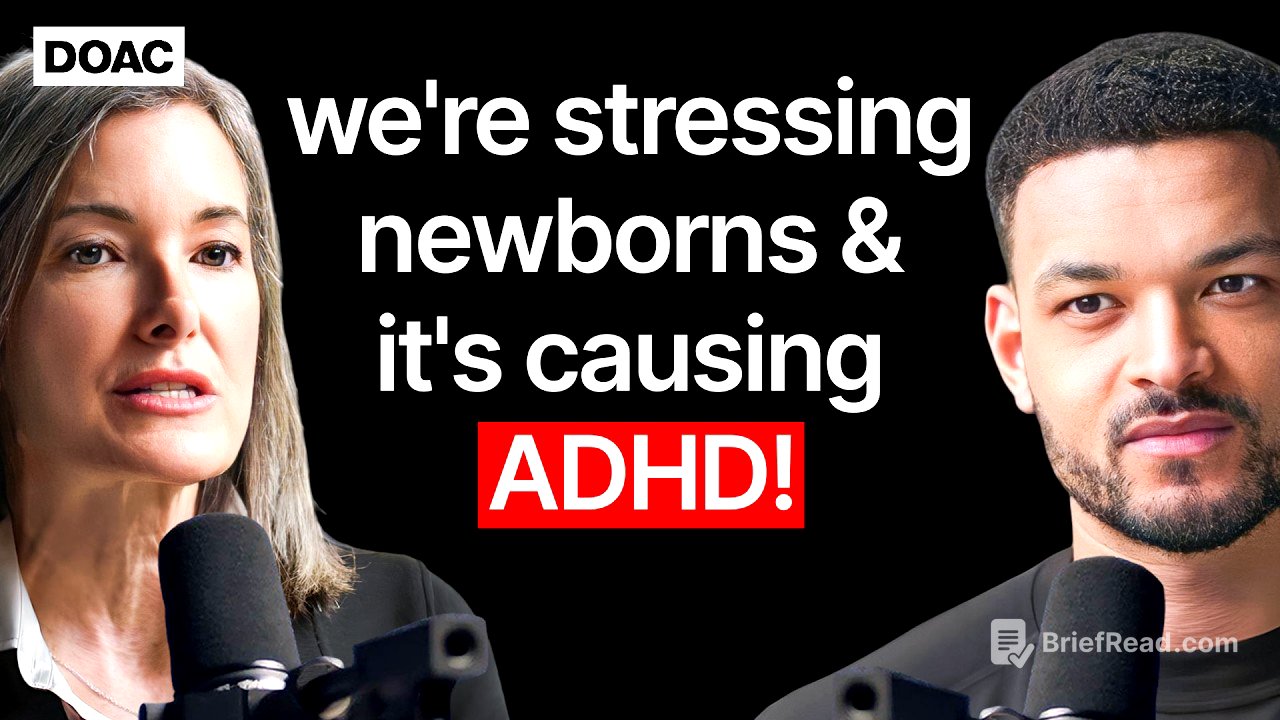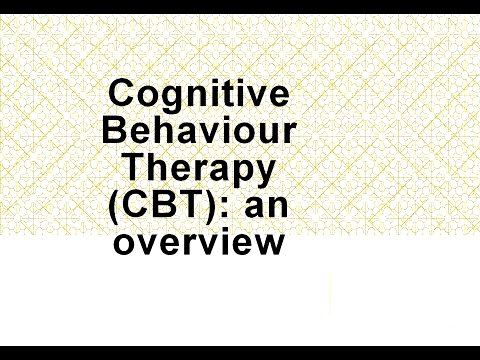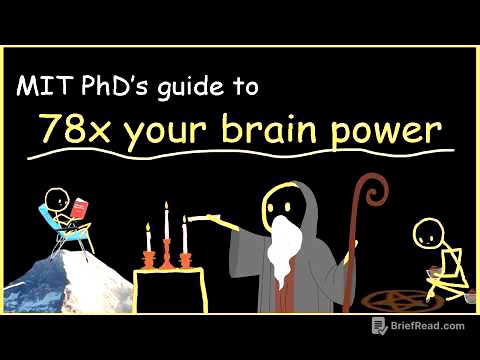TLDR;
Erica Komisar, a parenting expert and psychoanalyst, challenges societal norms on parenting and early child development, emphasizing the importance of presence, prioritization, and prevention. She argues that prioritizing careers and material success over children's emotional needs leads to mental health issues. She highlights the distinct roles of mothers and fathers, the impact of societal changes, and the importance of addressing childhood trauma.
- Presence, Prioritization, and Prevention are key to healthy child development.
- Mothers and fathers have distinct but equally important roles.
- Societal shifts towards self-centeredness have negatively impacted children.
Intro [0:00]
Erica Kamar is introduced as a parenting expert and psychoanalyst who challenges societal norms on parenting using 30 years of research. She aims to debunk myths about raising healthy children, such as the notion that daycare is beneficial for socialization. She emphasizes the importance of mothers' presence in the first three years for emotional security and criticizes the quality versus quantity time myth.
Erica's Mission [2:16]
Erica's mission revolves around three key principles: presence, prioritization, and prevention. She aims to educate parents, policymakers, clinicians, and educators about the critical importance of physical and emotional presence for children, especially during the crucial brain development periods of 0-3 years and adolescence (9-25 years). She stresses that children's mental health depends on attachment security, which is fostered by prioritizing their needs over material success and personal desires.
Erica's Background [5:17]
Erica Kamar is a psychoanalyst, social worker, and author with over 30 years of experience. She has observed an increase in mental illness among younger children, which led her to research epigenetics, attachment theory, and neuroscience. Her work indicates that children with less parental presence are more likely to develop mental health issues.
Who Are Erica's Patients? [8:26]
Erica's practice includes parent guidance, where parents seek advice on their children's development and symptoms, aiming to understand the root causes without resorting to medication. She also sees individual patients for depression and anxiety, as well as couples. Many parents seek her guidance preventatively to raise healthy children amidst societal misinformation.
How Have Social Changes Influenced Parenting? [9:49]
Society's shift towards self-centeredness, individualism, and the "me" movement, along with the feminist movement, has negatively impacted children. While these movements had positive effects, they also led to children being abandoned emotionally, with their neurological and emotional needs unmet. Babies are now often perceived as resilient to stress and separation, which contradicts their evolutionary need for physical contact and attachment security with their mothers.
Is the Role of a Mother More Important Than That of a Father? [13:14]
Mothers are essential for sensitive, empathic nurturing, especially in infancy. They soothe babies, regulating their emotions through skin-to-skin contact and soothing tones. This helps babies learn to regulate their emotions by age three, developing a sense of security. Mothers also protect babies from stress by providing oxytocin, the love hormone, which buffers against cortisol.
Why Are Fathers Important From a Biological Level? [16:44]
Fathers produce oxytocin differently, making them playful, tactile stimulators. They encourage exploration, risk-taking, and separation. Fathers help regulate excitement and aggression, which is crucial for boys. Both parents are critical, but their roles differ due to hormonal influences. Fathers produce vasopressin, the protective hormone, making them attuned to predatory threats.
Is Guilt a Bad Thing? [21:07]
Guilt is not inherently bad; it indicates a functioning ego and the ability to distinguish right from wrong. It signifies internal conflict between personal desires and a baby's needs. Feeling guilty means one can recognize the distress caused by their absence. Avoiding guilt can lead to poor decisions with long-term consequences.
Erica's Unpopular Ideas About Parenting [23:34]
Raising healthy children requires sacrificing time, money, and freedom, leading to discomfort and frustration. Children raised in a self-centered environment are more emotionally fragile and have difficulty tolerating frustration and pain. The norm of hiring baby nurses to avoid nighttime care is contributing to this fragility.
Family Diaspora: Raising Children Without Extended Family [25:31]
Parents are increasingly isolated, lacking the extended family support that was common in the past. This isolation makes dealing with the pain and discomfort of parenting alone overwhelming. The family diaspora, where people move away from their families of origin, exacerbates this issue.
Can Raising Children Away From Extended Family Be Justified? [27:45]
Children thrive in extended family situations. While pursuing careers and passions is valid, it can come at the cost of children's well-being if parents are not physically and emotionally present, especially in the early years. Children may break down, and a parent's happiness is often tied to their least happy child.
Voluntary Childlessness [28:44]
Some people choose not to have children, missing out on the deep and rewarding emotional connection unique to parenting. Trauma or negative experiences with parenting can make it harder to connect with children.
Attachment Disorders [29:39]
Attachment disorders arise when parents push the limits of separation, leading to insecure attachments. Secure attachment involves a joyful reunion after separation, indicating safety and prioritization. Avoidant attachment disorder manifests as a baby turning away from the parent, correlated with later depression. Ambivalent attachment disorder involves clinging, indicating anxiety about abandonment. Disorganized attachment disorder, the most challenging, involves cycling through strategies and is linked to borderline personality disorder.
How Do Attachment Disorders Manifest in Adulthood? [33:54]
Avoidant attachment in adulthood results in difficulty forming deep connections and committing. Ambivalent attachment leads to anxiety and clinginess, potentially suffocating partners. Disorganized attachment is associated with emotional volatility and self-harm.
Choosing a Partner Based on Attachment Styles [35:08]
Healthy individuals seek reciprocal, loving relationships. Avoidant individuals may attract others who also avoid commitment, though these relationships can break down. People are often attracted to others of similar attachment styles, but these relationships are not necessarily healthy.
Predicting Relationship Success Based on Attachment Styles [36:34]
Securely attached individuals are more likely to have successful relationships due to their ability to trust and form deep connections. Disorganized attachment makes forming and maintaining relationships very difficult.
Does Having More Children Correlate With Neglect? [38:07]
Maternal depletion syndrome can occur in the developing world when mothers have too many children in a short period, leading to physical and emotional exhaustion. Raising children is stressful, requiring sleeplessness and tolerance for discomfort.
Decline in Birth Rates [39:33]
Developed countries are experiencing declining birth rates. The more alarming trend is people choosing not to have children, indicating a societal devaluation of raising children and forming deep relationships.
What Is Unique About Relationships With Your Own Children? [41:36]
Relationships with children involve a unique level of dependency and care, fostering personal growth. While not everyone should have children, those who do should address their own upbringing and traumas to avoid generational transmission of attachment disorders and mental illness.
What Contributes to Growing Infertility Among People? [43:25]
Infertility is a growing global issue, influenced by environmental factors, delaying childbirth, and stress. The practice of freezing eggs is not a guarantee of future fertility. The myth that one can "do everything all at the same time and do it well" is also challenged, as balancing a demanding career with raising healthy children is difficult.
How Did Erica Manage to Balance Work and Motherhood? [46:59]
Erica had a career before having children and made an agreement with her husband to take a long period off and return to work minimally. She chose a flexible career and took six months off with each child, returning to work only a few hours a day to cover the cost of a mother's helper. They prioritized parenting over material possessions.
Should Fathers Be the Stay-at-Home Parent? [49:02]
In the early days, mothers are more connected to babies through birth and breastfeeding. Fathers become important when children are mobile, encouraging exploration and helping regulate excitement and aggression. Prioritizing attachment security is essential for healthy separation.
Harlow's Study on Rhesus Monkeys [51:32]
The rhesus monkey study demonstrated the importance of touch and nurturing. Monkeys with nurturing mothers were healthy, while those with wire mothers became neurotic. Babies given nothing lost their minds. Michael Meaney's study on licking and grooming showed that nurturing behaviors pass down resilience to stress generationally.
The Challenge of Motherhood in Poor Socioeconomic Conditions [53:52]
America is criticized for lacking paid parental leave, unlike most other countries. Creative solutions, such as borrowing from Social Security, could help families afford to care for their children. The longitudinal attachment research shows that insecurely attached children at 12 months are likely to remain insecurely attached and suffer from mental disorders 20 years later.
Does More Paid Leave Equal Better Childcare? [57:50]
Longitudinal attachment research demonstrates that secure attachment in infancy correlates with positive outcomes in adulthood, while insecure attachment often leads to mental health issues. Paid leave, when used to be present with children, benefits their development.
Connection Between Upbringing and Success in Adult Life [59:24]
While some successful individuals had neglectful upbringings, Erica advises against intentionally replicating those conditions. Narcissistic parenting, which projects parental needs onto children, can be abusive. The greatest gift is allowing children to be authentic individuals. Supporting a child's genuine interests is recommended, ensuring the child drives their pursuits.
ADHD: Why Has It Risen So Much in the Past Decade? [1:02:59]
The rise in ADHD diagnoses is linked to increased stress in children. ADHD is often a stress response, with children in fight-or-flight mode. The amygdala, the stress-regulating part of the brain, becomes overactive due to early separation and stress, leading to hyperactivity and impulsivity.
ADHD Kids Are in Hypervigilant Stress Mode [1:08:06]
ADHD children are in hypervigilant states of stress, which can lead to hypo-vigilant states and depression. Instead of addressing the root causes of stress, children are often medicated to relieve symptoms.
We're Medicating ADHD Wrong [1:10:05]
Treating ADHD with medication alone is considered malpractice. The focus should be on identifying and addressing the stressors causing the child to go into fight or flight. Parent guidance is recommended before medicating children.
The Top Stressors We're Exposing Our Children To [1:11:50]
Stressors include early daycare, divorce, parental conflict, sibling rivalry, the birth of another child, moving, and parental illness or addiction. Stress can be regulated if parents are introspective and willing to address their role.
Is ADHD Hereditary? [1:13:54]
There is no direct genetic precursor to ADHD, but a sensitivity gene (short allele on the serotonin receptor) makes individuals more prone to stress. Sensitive, empathic nurturing in the first year can neutralize the expression of this gene.
Can MRI Scans Spot ADHD? [1:17:18]
Individuals with ADHD are more sensitive to stress. MRI scans can show brain activity, but they don't negate the role of stress. Sensitivity is a strength if met with sensitivity.
What's Wrong With Medicating Children? [1:19:15]
Stimulant medication can cause anxiety, panic attacks, and growth issues. While medication can be life-saving in some cases, it is often used as a performance-enhancing drug due to societal pressure.
What Actually Is Anxiety? [1:22:06]
Depression is preoccupation with past losses, while anxiety is preoccupation with future losses. Both are related to loss. Modern generations are preoccupied with material success and fame, rather than relationships, love, connection, and health.
The Link Between Stress and ADHD [1:23:40]
Children with high ACE (Adverse Childhood Experiences) scores are more likely to have ADHD. Factors include socioeconomic hardship, parental divorce, familial mental illness, and neighborhood violence.
What to Do if a Kid Screams in a Supermarket [1:24:47]
An emotionally regulated, healthy parent produces a healthy child. Acknowledge the child's feelings before disciplining. Use empathy and structure, recognizing the child's emotions while setting boundaries.
The Different Types of Trauma [1:28:19]
Big "T" traumas are concrete events like accidents or abuse, while little "t" traumas are relational nuances like subtle neglect or emotional unavailability. Most people seek therapy for little "t" traumas, which are often not reinforced by society as valid traumas.
Stressful States [1:31:49]
Daycare raises salivary cortisol levels, putting babies in stressful states. It increases aggression, anxiety, and behavioral problems. The best childcare option is the primary attachment figure, followed by kinship bonds. Children don't need socialization before age three; they need one-on-one connection and emotional needs met.
Same-Sex Couples Taking Roles [1:35:08]
In same-sex couples, one partner should take on the sensitive, empathic role (mother figure), while the other takes on the playful, tactile stimulation role (father figure). Children need both a mother and a father figure.
What Happens When Women Are the Primary Breadwinners? [1:36:46]
Couples should prepare for changes when having a baby and strategize how to manage potential shifts in roles. Competition between partners can cause marital conflict. Success in marriage involves complementing each other and working as a team.
What Should Career-Driven Mothers Do? [1:41:15]
Certain demanding careers make it harder to be a present parent. Quality time is a narcissistic fantasy; parents must be available on the child's time. Good careers for primary caregivers include service fields and entrepreneurial ventures that offer flexibility.
Not Everyone Can Do This Stuff [1:44:33]
The primary caregiver should have a career with control and flexibility. Extended family or close friends should be the preferred childcare providers.
Children Don't Need Other Kids Until the Age of 3 [1:47:49]
Children don't need other kids until age three; they engage in parallel play and need one-on-one connection. Playdates and playgroups are beneficial if the caregiver is within earshot for emotional refueling.
What's So Important at 3 Years Old? [1:51:23]
Neuroplasticity makes the age of three critical. Neurogenesis (cell growth) is most active from 0-3, with the caregiver's presence buffering the child from stress and regulating emotions. By age three, 85% of the right brain is developed. From 3-9, brain growth continues at a slower pace. Adolescence (9-25) involves pruning back cells.
Can I Repair My Trauma and Brain Past My 30s? [1:57:57]
It takes a relationship to cause trauma and another relationship to repair it. Therapy requires a consistent relationship with a therapist for emotional repair. Romantic relationships can help, but overburdening loved ones with past trauma can corrupt the relationship.
Our Pain and Trauma Are Rooted in Childhood [2:01:08]
Healing requires being open and trusting. Defenses protect us, and they should only be removed if they can be replaced with healthier ones.
Is "Daddy Issues" a Thing? [2:04:58]
Romantic relationships with opposite-sex parents are crucial for sexual and relational development. Absent or emotionally unavailable fathers can lead to a missing piece in a child's development. Abusive fathers can cause children to seek out abusive relationships.
Are We Taking Men's Purpose Away? [2:08:58]
Men's purpose has been diminished by societal changes. The feminist movement, while positive in many ways, has sometimes been vengeful and denigrated men. Men feel discouraged and purposeless.
Men's Testosterone Drops When They Become Fathers [2:13:06]
There is an inverse relationship between oxytocin and testosterone. When men stay home to nurture, their testosterone levels decrease, leading to depression and sexual dysfunction.
What Happens When Men Become the Primary Caregiver? [2:15:28]
Men who stay home and nurture may experience lower testosterone, affecting their sex drive and overall well-being. This is not instinctually normal and can be problematic.
Should We Split Schools Into Genders? [2:18:46]
Boys and girls should be educated separately in the early years. Boys need physical activity and short attention spans, while girls can sit quietly for longer. Single-gender education allows children to take risks and try new things without gender stereotypes.
Testosterone Decrease [2:21:35]
Couples need to discuss competitiveness, envy, jealousy, and disappointment. Women may have conflicting feelings about their husbands caring for children.
Raising Healthy Kids in a World of Technology [2:23:36]
No technology under age two. Regulate technology use to avoid addiction and stress. Social media is particularly harmful to adolescent brains, causing perfectionism, social isolation, and self-consciousness.
The Importance of Being Present With Your Child [2:27:10]
Presence is critical to children's mental health. Caregiving cannot be generically assigned to others. Delegate other tasks, but spend time with children.
What Should Employers Do? [2:28:12]
Employers should give as much time off as possible to primary caregivers and offer flexible work options. Accept that employees with young children may need to leave early.
Do You Realise How Controversial the Things You Say Are? [2:29:47]
Erica says controversial things because they are the inconvenient truths that prevent children from growing into healthy adults. She prioritizes children's well-being over being liked.
The Reason All of This Is So Personal to You [2:30:26]
Erica's personal story involves a loving but emotionally limited mother, which inspired her to be a better mother and treat people who want to be better parents.
What Does Your Obituary Say? [2:33:22]
Erica hopes her obituary will describe her as kind, generous, compassionate, fervent in her beliefs, stubborn, a good friend, a good mother, and a wonderful wife.









